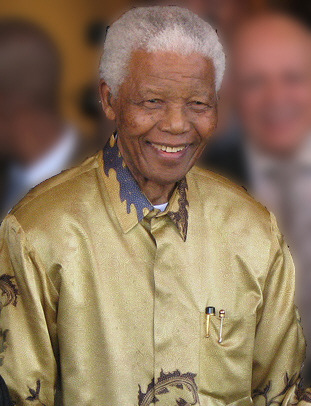Dear Friends,
 Nelson Mandela, a personal hero whose smiling face watches over my desk and one of our world's foremost champions of human rights and dignity, died today. Nelson Mandela, a personal hero whose smiling face watches over my desk and one of our world's foremost champions of human rights and dignity, died today.
For peace and justice activists committed to nonviolence as the "only" means for social change, the model of liberation movements that include armed resistance, such as the African National Congress (ANC) that Mandela led for decades (much of the time from exile or prison), is complex and controversial.
Bill Sutherland and Matt Meyer's Guns and Gandhi in Africa: Pan African Insights on Nonviolence, Armed Struggle, and Liberation in Africa (2000, Africa World Press) is an outstanding resource for considering this debate. As Archbishop Desmond Tutu describes in the book's foreword, "By challenging us to better understand concepts often seen as opposed to one another -- like nonviolence and armed struggle -- [the authors] help to focus our attention on the larger struggles we must still wage, united: for economic justice, for true freedom and equality, and for a world of lasting peace. ... The policies of the new South Africa help explain our responses to the violence of the past, such as our constitution that guarantees human rights, coexistence, and development opportunities for all, irrespective of color, race, class, belief, or sex."
As a pacifist-rooted interfaith organization committed to the transformative power of nonviolence, FOR has long sought to engage this ideological dispute. A short while ago, I spoke to George Houser, 97, who as a FOR staffer in the 1940s and '50s led the U.S. solidarity movement with emerging African liberation struggles. In a low voice, George expressed his deep sorrow at the news of Madiba's death.
George cofounded the American Committee on Africa in 1953, and served as its executive director from 1955 to 1981, through the era when most African nations shed their colonial powers. He worked with ANC leaders from Walter Sisulu and Oliver Tambo to Nelson Mandela, and in an interview for the landmark book No Easy Victories (2008, Africa World Press) said the following:
"After Sharpeville, 1960, the picture changed because South Africa and the ANC had been nonviolent organizations, and they made a decision after the Sharpeville Massacre of March 1960 -- because the government banned the ANC and the Pan-Africanist Congress, and they had to go underground. Tambo -- Oliver Tambo, whom I knew well and worked with, left South Africa. We invited him over; he came over in 1960 and toured around the U.S. The whole situation changed after the Sharpeville Massacre, and the ANC went underground and decided that the armed struggle was the way they should go.
"I contend, however, that what really brought the change in South Africa was not the armed struggle, which was never equal to what the government had, but international pressure, sanctions and all that sort of thing which we helped work on here. And also the internal struggle in South Africa, the boycotts and the strikes and such that took place within South Africa while the ANC was banned and other movements arose."
This summer, FOR continued to engage these questions and themes in a series of articles on President Mandela's life and legacy by grassroots South African and U.S. anti-apartheid and social justice activists.
We invite you to read these articles now and post your comments, and also encourage new submissions for potential publication:
- "Reflecting Mandela: A Disposition of Reconciliation and Restoration" by Kelvin Sauls, pastor of Holman United Methodist Church, Los Angeles CA
- "Reflections on the Life of Nelson Mandela" by Donna Katzin, executive director of Shared Interest
- "Nelson Mandela: A Prophet for the 21st Century" by Ruby Sprott, chair of the Riverside Church's Mission and Social Justice Commission
- "Nelson Rohlilala Mandela: Living Legend of a Leader" by Wilma Jakobsen, rector of Saint Jude's Episcopal Church, Cupertino CA
- "Nelson Mandela, Oscar Lopez Rivera, and the Charge of Terrorism" by Nozomi Ikuta, co-chair of the Interfaith Prisoners of Conscience project
- "Nelson Mandela: A National Agenda for Inclusion and Democracy" by Anita Kromberg and Richard Steele, South African members of the International Fellowship of Reconciliation
- "Nelson Mandela and Stand My Ground" by Diane Porter, past C.E.O. of National Training Laboratories
A few weeks ago, I wrote, "I will never forget meeting Nelson Mandela during his first U.S. visit," referring to his visit to New York in 1990 soon after his release after 27 years of imprisonment by the apartheid state. As a young human rights activist, Madiba was a shining light to me of the power of stalwart resistance to white supremacy and institutional racism. He continues to do so today, as I join the world in saying, "President Nelson Mandela, presente!"
In peace,
Ethan Vesely-Flad
Director of Communications
Fellowship of Reconciliation |